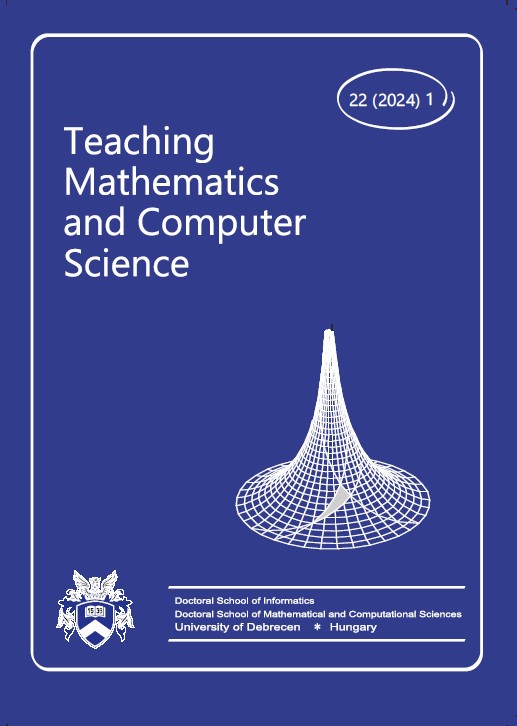The use of e-tests in education as a tool for retrieval practice and motivation
Author
View
Keywords
License
Copyright (c) 2024 Gabriella Papp

This work is licensed under a Creative Commons Attribution 4.0 International License.
How To Cite
Abstract
In many studies we can read about what techniques are used in the educational process to deepen knowledge, and what can motivate students to learn. We aimed to give our students (who will be a teacher) a practical demonstration of learning techniques. We carried it within the framework of a course, at the end of which we also examined how much it motivates students if they write an e-test as a retrospective in order to deepen the material of the lesson. In the paper, we will present the results of the research as well as students’ opinions regarding the motivating effect of the tests.
Subject Classification: 97-01, 97D40, 97I10
References
- Anderson, L. W., & Krathwohl, D. R. (2001). A taxonomy for learning, teaching and assessing: A revision of Bloom’s taxonomy of educational objectives. Longman.
- Armstrong, P. (2010). Bloom’s taxonomy. Vanderbilt University Center for Teaching. https://cft.vanderbilt.edu/guides-sub-pages/blooms-taxonomy/
- Bjork, R. A. (1988). Retrieval practice and the maintenance of knowledge. In M. M. Gruneberg, P. E. Morris, & R. N. Sykes (Eds.), Practical aspects of memory II. (pp. 396–401). Wiley. https://bjorklab.psych.ucla.edu/wp-content/uploads/sites/13/2016/07/Bjork1988ReRetrieval.pdf
- Brame, C. J., & Biel, R. (2015). Test-enhanced learning: The potential for testing to promote greater learning in undergraduate science courses. CBE Life Sciences Education, 14 (2), 1–12. https://doi.org/10.1187/cbe.14-11-0208
- Ceglédi, I. (2011). A matematika tanításának pedagógiai – pszichológiai vonatkozásai. EKF. https://dtk.tankonyvtar.hu/bitstream/handle/123456789/8131/0038_matematika_Cegledi1.pdf?sequence=2&isAllowed=y
- Csapó, B. (2004). Tudásszintmérő tesztek. In I. Falus (Ed.), Bevezetés a pedagógiai kutatás módszereibe (pp. 277–316). Műszaki Könyvkiadó. https://core.ac.uk/download/pdf/84775002.pdf
- Demkanin, P., Hajdúk, M., Hanuljakova, H., Kubis, T., Lapitka, M., & Malcík, M. (2015). Metodika tvorby testovych úloh a testov. Národny ústav certifikovanych meraní vzdelávania. https://www.researchgate.net/publication/349279914_Metodika_tvorby_testovych_uloh_a_testov
- Fuqoha, A. A. N., Budiyono, B., & Indriati, D. (2018). Motivation in mathematics learning. Pancaran Pendidikan, 7 (1). https://doi.org/10.25037/pancaran.v7i1.151
- Gonzalez, J. (2017). Retrieval practice: The most powerful learning strategy you’re not using. Cult of Pedagogy. https://www.cultofpedagogy.com/retrieval-practice/
- Guncaga, J., Korenova, L., & Kostrub, D. (2018). The educational research focused on the development of mobile technologies in education. In M. Artois (Ed.), Teaching with technology: Perspectives, challenges and future directions (pp. 57–115). NOVA Science Publishers.
- Kim, R. (1998). A belső motivációt befolyásoló tényezők és megjelenésük a Montessori-pedagógiában. Új Pedagógiai Szemle, 48 (3), 44–54. https://ofi.oh.gov.hu/belso-motivaciot-befolyasolo-tenyezok-es-megjelenesuk-montessori-pedagogiaban
- Kónya, E., & Kovács, Z. (2019). Do calculators support inductive thinking? The Electronic Journal of Mathematics and Technology, 13 (2), 181–189.
- Korenova, L. (2013). Usage possibilities of e-tests in a digital mathematical environment. Usta ad Albim BOHEMICA, 13 (3), 77–83.
- Korenova, L. (2015). What to use for mathematics in high school: PC, tablet or graphing calculator? International Journal for Technology in Mathematics Education, 22 (2), 59–64. https://doi.org/10.1564/tme_v22.2.03
- Molnár, E. K., & Vígh, T. (2013). A tantervelmélet és a pedagógiai értékelés alapjai. “Mentor(h)áló 2.0 Program” TÁMOP-4.1.2.B.2-13/1-2013-0008 projekt. http://www.jgypk.hu/mentorhalo/tananyag/Tantervelmlet_s_a_pedaggiai_rtkels_alapjai/index.html
- OnlineTestPad. https://onlinetestpad.com/
- Orosz, Gy. (1994). Motiváció a matematikaórákon. In Az Eszterházy Károly Tanárképző Főiskola tudományos közleményei (Új sorozat 22. köt.). Tanulmányok a matematikai tudományok köréből = Acta Academiae Paedagogicae Agriensis. Sectio Matematicae (pp. 155–162). http://publikacio.uni-eszterhazy.hu/id/eprint/4200
- Panayides, P. (2013). Coefficient alpha: Interpret with caution. Europe’s Journal of Psychology, 9 (4), 687–696. https://doi.org/10.5964/ejop.v9i4.653
- Polinski, O. S., & Kuchinka, K. J. (2023). The development of mathematics anxiety in secondary school students in the context of gamification. Current issues in modern science, 10 (16), 696–705 (in Ukrainian). https://doi.org/10.52058/2786-6300-2023-10(16)-696-705
- Roediger, H. L., Agarwal, P. K., McDaniel, M. A., & McDermott, K. B. (2011). Test-enhanced learning in the classroom: Long-term improvements from quizzing. Journal of Experimental Psychology. Applied, 17 (4), 382–395. DOI: 10.1037/a0026252.
- Roediger, H. L., & Karpicke, J. D. (2006). Test-enhanced learning: Taking memory tests improves long-term retention. Psychological Science, 17 (3), 249–255. https://doi.org/10.1111/j.1467-9280.2006.01693.x
- Román, E., & Kucsinka, K. (2019). Nem csak versenyre. In Limes: a II. Rákóczi Ferenc Kárpátaljai Magyar Főiskola tudományos évkönyve, VI (pp. 47–52). II. Rákóczi Ferenc Kárpátaljai Magyar Főiskola -“RIK-U” Kft.
- Schukajlow, S., Rakoczy, K., & Pekrun, R. (2023). Emotions and motivation in mathematics education: Where we are today and where we need to go. ZDM Mathematics Education, 55 (2), 249–267. https://doi.org/10.1007/s11858-022-01463-2
- Shabatura, J. (2022, 26 July). Using Bloom’s taxonomy to write effective learning objectives. tips.uark.edu. https://tips.uark.edu/using-blooms-taxonomy/
- Skemp, R. R. (2005). A matematikatanulás pszichológiája. Edge 2000 Kft.

 https://doi.org/10.5485/TMCS.2024.13495
https://doi.org/10.5485/TMCS.2024.13495






